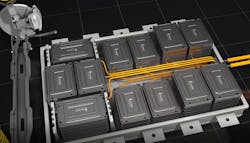NC State University & ComEd receive DOE grant to support $5M R&D study of EV Extra Fast Chargers
ComEd and North Carolina State University's FREEDM Systems Center have received a research and development grant of $200,000 from the U.S. Department of Energy (DOE) for a $5 million research project on developing low-cost, higher-efficiency extreme fast charging (XFC) for electric vehicles (EVs).
XFC will enable charging of EVs at a faster rate than Level 1 and Lever 2 chargers. Level 1 chargers are the slowest, taking approximately 50 hours to charge a standard 70kWh EV battery. The Level 2 chargers are faster, taking approximately 7.5 hours to charge a 70kWh EV battery.
The XFC charger will reduce battery charging time to as little as 15 minutes. The project will seek to develop and demonstrate an ultra-low cost, all-silicon carbide modular power converter for direct current charging equipment, which can connect to a medium voltage distribution system.
"The goal of this new project is to bring extreme fast charging much closer to market realization and support the continued adoption of electric vehicles by reducing consumers' charge anxiety," said Srdjan Lukic, Ph.D., NC State professor, deputy director of FREEDM and Principal Investigator for the project. "We could not achieve that without collaboration from project partners like ComEd."
Read EnergyTech's complete coverage of E-Mobility Moves in the C&I Energy Transition
Subscribe to our free, tri-weekly Email Newsletter for more
The project will be undertaken in two phases. The first phase will focus on cost analysis and system development. ComEd's Grid Integration and Technology (GrIT) Lab in Maywood, Illinois will be the initial testing location for this technology. The second phase will focus on system demonstration and ComEd will identify suitable locations for the purpose.
"The growth of electric vehicles has the potential to reduce harmful emissions and improve air quality for everyone, regardless of if they drive or ride in an electric vehicle, but the time it takes to fully charge an electric vehicle can be a deterrent to consumers," said Michelle Blaise, SVP of Technical Services at ComEd. "ComEd's engineers are industry-leading innovators, and we're honored to contribute our expertise and resources to find new technical solutions that will convince more consumers to switch to an EV."
The project is funded via collaborator cost shares, including $200,000 from ComEd. The other collaborators on the XFC EV development and demonstration project are Danfoss, GoTriangle, New York Power Authority and North Carolina Clean Energy Technology Center.
